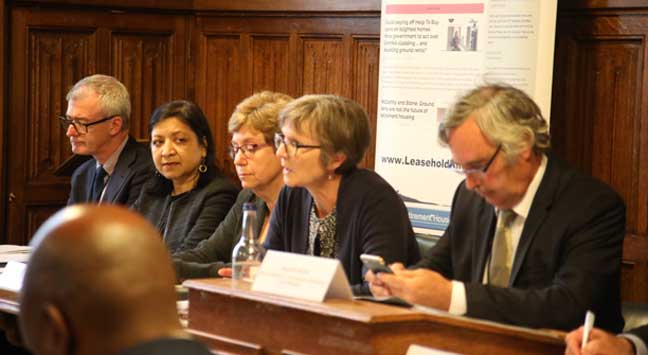
Susan Bright, professor of land law at Oxford University, has kindly contributed an article to Leasehold Knowledge Partnership. Below, she writes about her work on the ever-growing fleecehold scandal:
By Professor Susan Bright
In a recent study (Far from Privatopia, which is written about here), I discuss the trend towards private maintenance of residential estates in England and Wales.
Historically, apart from the so-called ‘Great Estates’ such as Hampstead Garden Suburb, local authorities would usually adopt the infrastructure on housing estates, homeowners paid their Council Tax for the public services and got on with their lives.
With many estates, this is no longer the model used. No longer are the roads, open spaces, play areas and drainage systems looked after and maintained by local government but instead they are retained by the developer and the costs of servicing them is paid for by the residents.
Sometimes these facilities, paid for by the homeowners, are also used by members of the public.
Homeowners also find that they are themselves subject to various restrictions on property use, and to onerous fees when asking permission to make alterations or sell.
There are many media stories about residents discontent with the money they have to pay, feeling they were misled when the bought their home, and concerned about the quality of maintenance.
Kidderminster estate residents hit out at ‘Fleecehold’ bills
Residents living on a Worcestershire housing estate say they have been left in “abject misery” paying for maintenance services that are not being carried out. Homeowners on the Stour Valley development in Kidderminster said the payments amounted to “fleeceholds”. Their service bills had also more than doubled in four years, some said.
The growth of these private residential estates raises issues concerning the protection of consumers and also may have significant mid-long term political and social consequences that both national and local governments should pay attention to.
Maybe, given the dearth of data about leasehold flats, it shouldn’t come as a surprise to learn that there also isn’t any published data about how many residential estates are run this way.
A voluntary organisation has been collecting information about the number of estates subject to some form of estate charge and has more than 770 separate sites (estates) recorded.
In part, the growth accompanied the increasing use of leases for the sale of houses which a House of Commons briefing paper noted can ‘represent a lucrative future income stream’ for developers.
Homeowners trapped by ‘fleecehold’ – the new cash cow for developers
Thousands of homeowners on private estates are facing unregulated and uncapped maintenance fees, amid allegations that developers have created a cash cow from charging for communal areas not maintained by the council. Management contracts for “unadopted” private estates are frequently sold off to speculators and property management companies in the same way as freeholds and ground rents – leaving homeowners with spiralling fees and nowhere to turn.
A recent report in The Times explains how residents at Steinbeck Grange, in Cheshire, were told that they had to use a solicitor recommended by the developer and were later shocked to discover the houses that they bought were leasehold, and that they had to pay ground rents and maintenance charges.
The use of leases on private estates has now largely stopped, with ground rents being restricted to a peppercorn after 30 June 2022 and the government having announced the intended prohibition of leases for the sale of houses.
But this does not mean that the wider problems faced by the residents of Steinbeck Grange will not continue. Although it will no longer be leases that are used to sell the houses, similar outcomes are achieved by using two other legal routes. Both are freeholds, but with strings attached.
The Steinbeck Grange leasehold scandal
Six months after moving into her new home, Carolyn Bellers received a bill for more than £800 that she did not understand. It was from Solitaire, a property management company she had never heard of and it was for the maintenance of communal carpets and lifts – but she lived in a mews house.
One is the estate rentcharge, which has the practical effect of ensuring successors pay the estate charge and are subject to the covenants.
The other is to put an entry on the Land Registry title that has the practical effect of ensuring that there is a direct contractual relationship (covenant) between the current homeowner and the developer and/or management company.
In my study I interviewed both freeholders (with the rentcharge and/or the direct covenant) and leaseholders: irrespective of the form of title many expressed deep dissatisfaction, raising similar concerns to the residents of Steinbeck Grange.
They considered that they were inadequately advised at the time of purchase and had little idea about what they were getting into.
Purchasers were ‘persuaded to use the developer’s recommended solicitor’; buying was described by some as a ‘big mistake’, and the absence of clear advice left some ‘fuming’. Neither the charges, nor the controls on homeowners were clearly flagged up.
‘Fleecehold’ complaints flood in as residents battle to turn tide
Last month Guardian Money revealed how thousands of homeowners, who bought on “unadopted” private estates, face escalating costs after developers sold off management contracts to private companies in what many describe as “fleecehold”. Following our report we were contacted by many homebuyers with tales of woe – but one name seemed to feature more than any other: Greenbelt.
Similar findings have been made by the Welsh government following a call for evidence to explore estates charges on housing developments, and the Conveyancing Association’s evidence to them stated that buyers are rarely aware of the charges.
There is often great unhappiness in relation to the amounts being charged for the services being received; hence the adoption of the term ‘fleecehold’ and these estates being referred to as ‘cash cows’ for developers.
Unlike for leasehold properties, there is no regulation of these charges and as former MP Helen Goodman has said, the fees are often ‘high, rising, uncapped and completely unregulated’, with ‘no transparency and little accountability’ (House of Commons Library Research Briefing, 18 December 2021, Freehold houses: estate charges).
In addition to the actual charges, many also complained about the unfairness of paying for things that should be a public service. It’s seen as a form of double taxation: you pay the council tax, and then you pay the estate charge for doing what local authorities should be doing.
Why is this happening?
Austerity may well play a part with local authorities seeking to avoid the responsibility for looking after new estates, and private maintenance arrangements may also be required as a planning condition.
But it may well be that developers are more than willing to play along.
To build the infrastructure to adoption standards will cost more – for example, many of the roads on private estates don’t meet the minimal standards for adoption.
There is also a sum paid by developers to local authorities for adoption. In an earlier study one housebuilder reported that 9 out of 10 roads were not adopted as they are ‘cheaper to build, to develop and it stays within your control.’ (Burgess and Jones, Road and Sewer Bonds). This report found that, over time, local authorities were encountering problems as infrastructure on these estates fell into disrepair and disgruntled residents turn to the local authority for help.
‘Fleecehold’: New homes hit by ‘hidden costs’
Paying unexpected costs on new-build homes has been dubbed the next PPI scandal waiting to happen, and has homeowners and MPs alike wanting solutions. But how safe from the charges are you? Owners of leasehold properties, for example, are finding out that while a brand new home may look like a dream, it could turn into a nightmare.
What needs to happen?
- We know so little about the emergence and governance of these private housing estates that it is important that data is gathered. How many such estates are there? How are they being looked after? Do residents have a voice in how they are run?
- There needs to be proper consideration given to the mid-long term maintenance costs. What happens if the private management company goes out of business? What happens if there are no reserves to cover unanticipated expenditure? Are they sustainable in the long term?
- As new leasehold reform is on the horizon, it needs also to encompass regulation of the charges on these estates, the fact that the tenure is freehold should not erode protection for the homeowners. In 2019, the government stated that it would introduce legislation to give equivalent rights to these freeholders to challenge the reasonableness of charges as it does to leaseholders. This must include both the service charge element and permission fees.
- As with the long campaign for leasehold reform that eventually led to the enfranchisement rights and the right to manage, so there needs to be a statutory framework that gives homeowners an appropriate level of control over their estate given that there is no democratic accountability in relation to the management company.
For Professor Susan Bright’s illuminating 23-page research paper on these issues, Far from Privatopia: Private Residential Estates in England and Wales, published in March and crammed with important secondary literature, download here.





 Richard Davidoff ex-employees apologise for libel, meanwhile fines against ABC Estates pile up
Richard Davidoff ex-employees apologise for libel, meanwhile fines against ABC Estates pile up






















So local councils are happy for these estates to exist as they have no responsibility to maintain common areas (roads and grassed areas for example). But the very same councils are happy to collect FULL council tax from the residents of such estates. The remedy is not for a discount on council tax, the remedy is for central government to outlaw all and every aspect of leasehold, including freehold which is not freehold. And for central government to make councils do their job.
We truly do live in a laissez faire world, if something can be done, it is done (and devised) by modern day capitalists. I blame the Beatles myself, they never should have written “Let it be”
Sue Bright may not have wished to be partisan, but it would have been nice if Home Owners Rights Network (AKA HorNet) was credited as the “voluntary organisation” which not only collates information, but actively lobbies for abolition of privately managed estates. HorNet also briefed MP Helen Goodman about the national picture for her private members bill.
We have formed the view that the model is developer driver (as in the US – read the book “Privatopia” for more) and we have a lot more about our campaign and collaboration on our web site!
If you have to pay estate fees due to the deals that councils do with developers,simple pay the fee and don’t pay Council tax as they caused the problem.
lol leasehold are capped and regulated.
They maybe regulated but the rules are set to ensure the can charge what they want.
Those crooks at Y&Management charge me for cleaning but since they took over 10 years ago no cleaner has set foot in the block. Whats the point in challenging them, I will just have to pay their costs which will out way any savings. So may be regulated but thats no help.